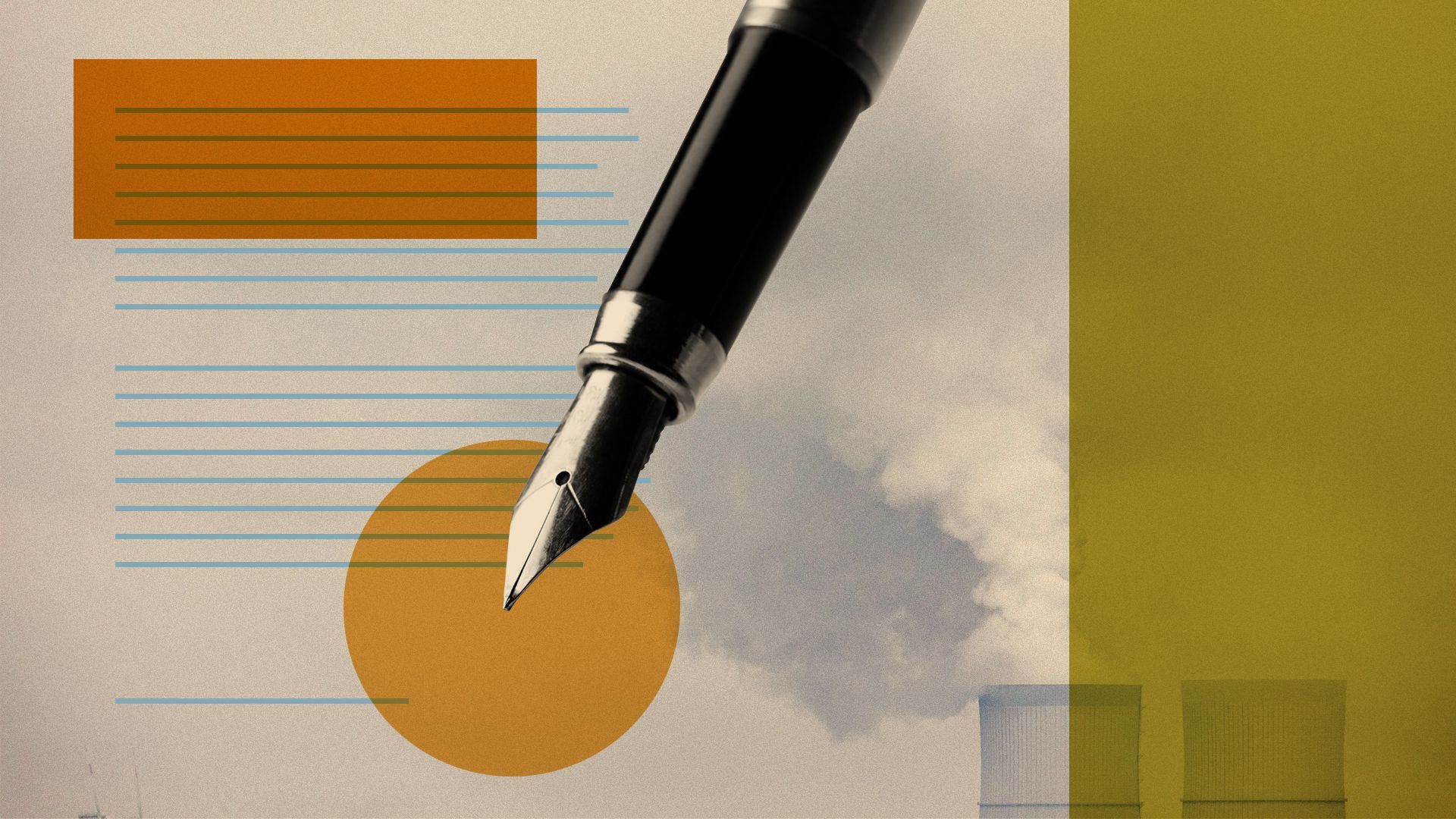| | | | | | | Presented By Build Nuclear Now: A project of the Breakthrough Institute & Third Way | | | | Axios Generate | | By Ben Geman and Andrew Freedman · Aug 04, 2022 | | 🚀 Off we go! Today's newsletter, edited by Mickey Meece, has a Smart Brevity count of 1,242 words, 5 minutes. 📬 Did a friend send you this newsletter? Welcome, please sign up. 🎶 This week marks 40 years since Michael McDonald released "If That's What It Takes," which provides today's perfect intro tune... | | | | | | 1 big thing: Climate-shaming celebrities |  | | | Photo illustration: Shoshana Gordon/Axios. Photo: Dave J Hogan/Getty Images | | | | Celebrities would be doing the Earth a favor if they cut back on private jets, but combating global warming will require bigger systemic changes, not just better personal behavior, Ben writes. Driving the news: A recent report from Yard, a U.K. marketing firm, found that Taylor Swift's flying habits put her atop the list of celebrity emissions "offenders" — and gets at a long-running debate about how much of a difference individual decisions make. The big picture: Private planes spew a lot of CO2. And this is hardly the first time celebrities or political leaders — including Al Gore, Elon Musk and Drake — have been shamed for their carbon-intensive lifestyles. - A 2021 analysis from Oxfam and the Institute for European Environmental Policy found that consumption by the world's richest 1% accounted for 15% of global emissions in 2015.
- Transport & Environment, a European NGO, estimates an hour-long flight in a private jet can emit roughly a fourth of the average European's annual emissions.
Yes, but: Slashing emissions enough to meet Paris Agreement goals would require deep, systemic policy changes. Think tougher regulations on polluting industries, putting a price on carbon emissions, more government finance for cleantech, and more. What they're saying: "My feeling is that while I would prefer Taylor Swift make more responsible transportation decisions, shouting at celebrities on the internet is not in my personal top 10 list of policy levers," NASA climate scientist Kate Marvel said via email. - (Swift disputes the report about her private jet use. Yard admits it's "not conclusive," and is based on one celeb-flight tracking Twitter account. Swift's camp says it captured flights from people who borrowed the jet; Jay-Z's rep told the Washington Post that it tracked a plane he doesn't even own.)
Zoom in: A major International Energy Agency report on pathways to reaching net-zero global emissions in 2050 helps to put personal decisions into context. CO2 emissions between 2021 and 2050 could be about 4% lower through behavioral changes like driving less, driving slower, using less climate control and curbing business travel, the report says. Read the whole story. |     | | | | | | Bonus: Zooming in on behavior and planes |  Reproduced from IEA; Chart: Axios Visuals Cutting private jet travel can help curb emissions from aviation, but broadly changing global flying habits too can do even more, Ben writes. The big picture: The chart above, via the International Energy Agency, looks at behavioral changes that can reduce energy consumption. It's part of a behavior-focused section of their far wider analysis of net-zero emissions pathways. Yes, but: As we noted above, behavior changes don't negate the need for more systemic policy and financial transformations in Paris-friendly energy scenarios. |     | | | | | | 2. Record melt in Svalbard spotlights warming |  | | | Satellite image of the rapidly melting glaciers in Norway's Svalbard archipelago. (Copernicus/EU) | | | | The Norwegian Arctic archipelago of Svalbard, situated northeast of Greenland, is seeing a record melt season tied to human-caused global warming, scientists tell Axios, Andrew writes. Why it matters: The meltwater is pouring into the Atlantic Ocean, where it helps to raise sea levels. - The rapid melt this year demonstrates Svalbard's status as one of the fastest warming places in the Northern Hemisphere, at more than three times the rate of lower latitudes.
Zoom in: According to Xavier Fettweis, a researcher at the University of Liège, the mean meltwater runoff so far in 2022 is 42.6 billion metric tons, which is 3.5 times larger than average and 1.4 times greater than the previous record set in 2018. - Fettweis said the meltwater runoff anomaly is five times the variability from year to year during the 1981-2010 period.
- "Only a changing climate can explain this," he said via email.
Context: Unlike glaciers that terminate in floating ice shelves, most glaciers in Svalbard melt at the base, and instead do so from the surface down. - However, Fettweis pointed to the suspended sediment in waters near Svalbard seen in satellite photos as an ominous indication that melting is now occurring beneath the glaciers.
- Early snowmelt this year helped to prime ice surfaces for melting, Ted Scambos of the University of Colorado at Boulder, told Axios in an email. So have consistently mild temperatures since May, he said.
Read more. |     | | | | | | A message from Build Nuclear Now: A project of the Breakthrough Institute & Third Way | | License advanced nuclear reactors now | | |  | | | | Clean, secure, homegrown, advanced nuclear energy is the safe, zero-carbon energy solution that America needs — but time is running out. America's policies must support this technology, or we risk falling behind as a global leader in nuclear energy. Find out more. | | | | | | 3. 🏃🏽♀️Catch up fast on markets and business | | 📉 Oil is trading around its lowest levels in over five months, with the U.S. benchmark WTI near $91, after falling steeply yesterday, Ben writes. - The move followed federal data showing a jump in U.S. commercial crude stockpiles. But there's a host of other forces in play, too.
- "New talks in Vienna over the [Iran] nuclear accord may also be contributing to some of the weakness," Oanda analyst Craig Erlam said in a note.
⚒️ Mining and commodity trading giant Glencore this morning announced it made an $18.9 billion profit in the first half of 2022, more than double the same stretch last year. - "[T]he world's top coal shipper...has been one of the biggest winners from the global energy crunch as demand surges for fossil fuels," Bloomberg reports.
🚗 "Electric-vehicle maker Lucid Group Inc. said it expected to make half as many cars as previously forecast this year, citing supply-chain and logistical challenges that have troubled the wider auto industry as well as the company's own problems," the Wall Street Journal reports. |     | | | | | | 4. What Kyrsten Sinema wants in the climate bill |  | | | Photo illustration: Brendan Lynch/Axios. Photo: Florian Gaertner/Getty Images | | | | Sen. Kyrsten Sinema (D-Ariz.) is eyeing changes to Democrats' $740 billion reconciliation bill by increasing climate funding and restructuring the tax provisions, Axios' Alayna Treene reports. Why it matters: Sinema is the one senator potentially standing in the way of Democrats clinching President Biden's goal of passing a major package tackling climate change, health care and taxes. What we're hearing: Sinema hopes to significantly boost the bill's funding for addressing drought and water security in the Southwest, sources familiar with her thought process tell Axios. On taxes, Sinema has concerns with the structure of the 15% corporate minimum "book tax" and whether the burden could get passed down to employees, the sources said. The private equity industry, which has contributed heavily to Sinema, is lobbying her on cutting a provision that would close the carried interest loophole for private fund managers. Go deeper. |     | | | | | | 5. Record heat in August follows a record warm July |  Data: Southeast Regional Climate Center; Map: Erin Davis/Axios Visuals About 90 million Americans are under heat advisories or warnings today. This includes Norfolk, Washington, Philadelphia, New York City and Boston, as well as parts of Texas, Oklahoma and Kansas, Andrew writes. The big picture: The scorching heat follows a record-warm July, particularly in drought-plagued Texas. Threat level: "Record-breaking high and low temperatures" are likely in the Northeast and Mid-Atlantic today, and tomorrow, temperatures in the upper 90s to low 100s are forecast for the northern and central Rockies, the National Weather Service warns. - The forecast high in Washington, D.C., today is 98°F with a heat index of 105°F. Boston is forecast to reach 97°F.
As for last month, data analyzed by Axios' Jacob Knutson and Erin Davis shows that at least 43 locations across the U.S. set or tied records for their hottest July on record, according to NOAA data via the Southeast Regional Climate Center. By the numbers: San Antonio not only had its hottest July on record, with an average monthly temperature of 89.8°F, which was 5°F above average for the month, but it also had its third straight month of record-breaking heat. Go deeper: Extreme heat's ties to climate change |     | | | | | | 6. 🛢️Quote of the day | | "100,000 [barrels] is a slap to the face for President Biden." — Mizuho Securities USA analyst Robert Yawger He's talking about the OPEC+ decision to barely lift output next month, despite White House entreaties. Yawger isn't alone with the "slap" takes. Go deeper. |     | | | | | | A message from Build Nuclear Now: A project of the Breakthrough Institute & Third Way | | License advanced nuclear reactors now | | |  | | | | Clean, secure, homegrown, advanced nuclear energy is the safe, zero-carbon energy solution that America needs — but time is running out. America's policies must support this technology, or we risk falling behind as a global leader in nuclear energy. Find out more. | | | | 🙏Thanks for reading and see you back here tomorrow. |  | | Why stop here? Let's go Pro. | | | | | | Axios thanks our partners for supporting our newsletters. If you're interested in advertising, learn more here.
Sponsorship has no influence on editorial content. Axios, 3100 Clarendon Blvd, Arlington VA 22201 | | | You received this email because you signed up for newsletters from Axios.
Change your preferences or unsubscribe here. | | | Was this email forwarded to you?
Sign up now to get Axios in your inbox. | | | | Follow Axios on social media:    | | | | | |










No comments:
Post a Comment